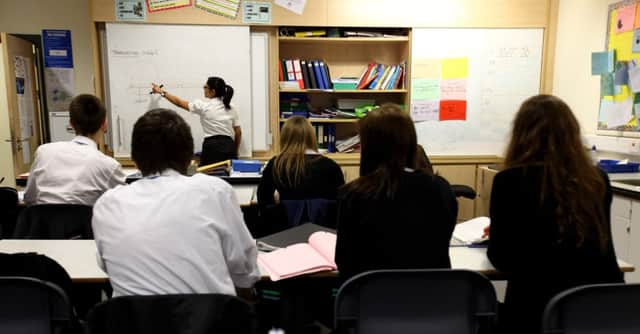Confidence in Scots schools falling among parents


The problem is most acute in more affluent areas of major cities, although remote small towns are also at the centre of concerns, according to the latest Scottish Household Survey.
The findings yesterday came as councils across the north of Scotland appealed to Nicola Sturgeon for help in tackling the ongoing problems they face attracting teachers to the area.
Advertisement
Hide AdAdvertisement
Hide AdThe First Minister last week pledged that addressing the “unacceptable” attainment gap between rich and poor areas would be her personal priority as First Minister – and urged Scots to judge her on the issue.


Opposition parties said the concerns of parents are “no surprise” given recent fears over stalling progress on key ares like literacy and numeracy.
The state-of-the-nation report sets out a sweeping picture of the lifestyle habits and changes among Scots over the course of the year.
It shows that fewer than half of Scots believe local councils – which run schools – are providing high-quality services, while just one in four feels they can influence the decisions affecting their areas.
It finds that 85 per cent of people were “very or fairly satisfied” with local schools when the current SNP government won its Holyrood majority in 2011. This fell to 83 per cent the following year, then to 81 per cent in 2013 and sunk to 79 per cent last year.
Scottish Conservative young people spokeswoman Liz Smith said: “Given the recent statistics which have been published about educational progress in Scotland, it is no surprise that the satisfaction levels for local schools has been falling during the time the SNP has been in government. Many parents are rightly disappointed with falling rates of literacy and numeracy, a widening attainment gap between rich and poor and cuts to teacher numbers.
“The public knows there is something badly wrong and the blame lies entirely at the door of a Scottish Government which has become obsessed with the wrong priorities for our schools.”
Advertisement
Hide AdAdvertisement
Hide AdSatisfaction levels with schooling is lowest in the least deprived parts of the country where they sit at 77 per cent and 78 per cent, the report finds. The findings were based on a survey of 5,720 Scots.
Scottish Labour public services spokesperson Jackie Baillie said: “Scotland’s teachers are working as hard as they can in the face of seemingly relentless cuts from the SNP government in Edinburgh.
“We have 4,000 fewer teachers in our classrooms and spending on education has been squeezed harder by the SNP in Scotland than the Tories in England.”
Scottish Liberal Democrat education spokesperson Liam McArthur added: “After eight years of SNP government, there are fewer teachers, higher class sizes, falling literacy levels and a growing attainment gap. It’s little wonder public satisfaction with the SNP’s record on local services is on the decline.”
But a spokesman for local council body Cosla insisted the satisfaction levels with Scottish schools have only “varied slightly” since 2007.
“With around 79 per cent of surveyed people indicating they are satisfied or very satisfied with schools then the only conclusion that can be drawn is that most people are happy with local schools even at a time of austerity,” he added.
“A result of 79 per cent is actually a good A pass at Higher after all – hardly a source of failure.”
A Scottish Government spokesperson said: “Recent qualifications results show that Scotland’s education is a success but we know that there is more to do. We are determined to ensure that all Scottish children succeed at school and in life.”
Advertisement
Hide AdAdvertisement
Hide AdAberdeen, Aberdeenshire, Moray, Highland, Orkney and Shetland councils unveiled plans for a joint summit on teacher shortages in their areas. They have called for urgent action at a national level to help address problems they face in recruiting and retaining teachers.
In Aberdeen there are currently vacancies for 36 primary teachers, 19 secondary school teachers and four additional support needs staff. The local authority said it also has nine vacant primary school head teacher posts as well as two at secondary level.
The councils want to see more teacher training places to be made available, more probationers and action to tackle the red tape which could allow them to hire more teachers outwith Scotland.
Aberdeen council leader Jenny Laing has written to the First Minister inviting her to attend the summit at the city’s Beach ballroom in October.
Transport
Road congestion is at its highest for six years.
The number of journeys involving delays increased by 2 per cent to 11.7 per cent.
Traffic reached a new record of 44.8 billion vehicle kilometres, up 2 per cent on 2013 and topping the previous peak in 2007.
The number of vehicles was at its highest for at least a decade, which also increased by 2 per cent to 2.8 million.
New vehicles, most of them cars, were also at a ten-year high, with 262,200 registered last year.
Climate change
Advertisement
Hide AdAdvertisement
Hide AdDespite the increasingly high profile of climate change on the global agenda, fewer than half of Scots consider it an urgent problem. The latest survey has shown just 45 per cent believe the issue is of immediate concern – a sharp drop from 57 per cent in 2008. It also reveals the youngest and oldest adults are the least worried, while more than a fifth are not convinced it is happening at all. The belief in its urgency also fell in direct relation to levels of academic and professional qualifications.
Relationship status
Most Scots are not married or in a civil partnership, the survey has found. More than a third (35 per cent) said they have never married or registered a same-sex civilpartnership.
Just 47 per cent of people are married at the moment, the report found. A further 2 per cent are separated, but still legally married, with 8 per cent divorced. There were 7 per cent of people who are widowed. Almost all (96 per cent) younger adults – aged 16 to 24 – are not married and never have been.
Religion
Half of Scots still describe themselves as Christian despite a general decline in organised religion in recent years.
About one in four (27.8 per cent) say they are Church of Scotland, but this is down from 34 per cent five years ago. A further 14.4 per cent describe them as Roman catholics. Other Christian churches such as the Frees, Wee Frees and Episcopalians, account for a further 7.7 per cent. Muslims account for about 1.4 per cent of Scots. A growing number of Scots (47 per cent) say they are not religious at all. The figure in 2009 was 40 per cent.
Rev Colin Sinclair of the Church of Scotland said: “These latest figures represent the challenges facing many established organisations in Scotland.”
Smoking
The number of smokers has fallen to its lowest level in 15 years, as only a fifth of Scots now smoke.
The level fell from 31 per cent in 1999 and 23 per cent over the last three years
Advertisement
Hide AdAdvertisement
Hide AdSmoking rates in the most deprived areas have dropped from 40 per cent in 2010 to 34 per cent in 2014.
The figures were hailed by ASH Scotland chief executive Sheila Duffy, who said it was “a significant step” towards a healthier Scotland.
Homeownership
Fewer Scots now own their own home, with more and more people renting from private landlords, the figures show.
Rates of home ownership have declined over the past five years from 66 per cent to about 60 per cent last year. The private rented sector has more then trebled from 5 per cent in 1999 to 14 per cent in 2014. In contrast, the percentage in the social rented sector has declined from 32 per cent in 1999 to 23 per cent in 2007 and has remained steady since. There are now 160,000 people on social housing waiting lists.
Neighbourhoods
Scots have pride in their local neighbourhoods with over 90 per cent saying they are very or fairly good places to live. Antisocial behaviour is relatively low in their area, most people think. The most common problem is dog fouling or barking, a problem for 31 per cent of people. Problems with neighbours, including loud parties and disputes, account for 17 per cent of problems. Drug dealing and mis-use is a rpblem for 11 per cent of Scots and rowdy behavour affects a further 11 per cent. But four in five (85 per cent) adults said they feel safe when walking alone in their neighbourhood after dark.
Volunteering
About one third of people provide unpaid help to organisations or groups. In 2014, 27 per cent of adults provided unpaid help to organisations or groups in the last 12 months.
Levels of volunteering have remained relatively stable over the past five years.
The type of organisations most commonly volunteered for are youth/children organisations (22 per cent), followed by those working with health, disability and social welfare organisations (21 per cent).
Advertisement
Hide AdAdvertisement
Hide AdYounger adults, and those in age groups 35 to 44 and 45 to 59 were more likely to volunteer with children and young people.
Personal finances
More people are feeling confident about their personal finances in Scotland.
The proportion of households reporting that they felt positive about their household finances increased from 48 per cent in 2013 to over half (52 per cent) in 2014. One quarter of households (25 per cent) reported not having any savings or investments in 2014 though around half (53 per cent) of households reported having savings of £1,000 or more. ver half (59 per cent) of single parent households reported having no savings.